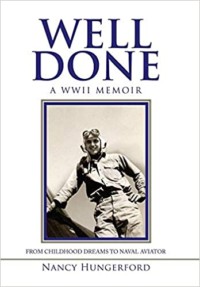Title: Well Done: A WWII Memoir
Author: Nancy Hungerford
Publisher: Xlibris
ISBN: 978-1664154865
Genre: Memoir
Pages: 282
Interviewed by: Barbara Bamberger-Scott
Interview Questions NANCY HUNGERFORD
What elements in your own personal storehouse of abilities and talents led you to decide you must write Well Done?
The book was an idea for many years based on Bob’s logs and journals. After a reunion with his squadron, many members became interested and provided their own notes. It sat for quite some time. I was prompted to complete this project after his death on the 4th of July weekend, 2020. I wanted to write a fitting tribute to him – and those who served. So many of them are unsung heroes. Frankly, it was my final “love story” for him.
What advice – supplementary materials, etc — would you suggest to a person preparing to read your work with no special knowledge of the historical era and wartime settings depicted?
Any material about the Greatest Generation — one wonderful NY Times article by Tom Hanks in 2020 when there was a resurge of interest in WW11. Of course, the book – THE GREATEST GENERATION.
Do you have plans for more nonfiction writing – your own memoir, perhaps?
I am working on a book about seasons with kittens, cats and cooking. After that, I plan a book about my four years at Catholic boarding school in the late 50’s. Because I am pretty funny, I now need to “lighten up.”
Does writing about the rise of oppressive regimes such as those of Germany and Japan in WWII evoke for you any parallels in the current world situation?
Only one. And it’s expressed in WELL DONE. How a major war such as WW11 ends, and we just don’t seem to learn. After all, wasn’t WW1 supposed to be “the war to end all wars?”
Did you ever, or do you plan to, visit any of the locales of the book, such as Pearl Harbor?
No.
Whom do you envision as the ideal reader for this book, the kind of person you hope most to reach and influence with Robert’s story?
The ideal reader – probably any member of the service. I also found it interesting that several young people who read the book hardly knew of the depression and that the Pacific Theater existed. It’s not just a war story. It’s also a young man searching for a goal, accomplishing it and reaching maturity. It’s probably a journey every young person embarks — in their own way.
What resources apart from Robert’s journals, etc, offered the best background for your story?
Just taking pieces from the journals (both his and his buddies) and then fact checking and embellishing them. I spent a lot of time on Google. It sure beats lifting heavy encyclopedia books.
What advice would you offer to other writers wishing to undertake the creation of a “first person” memoir about a “third person” such you have daringly composed?
Probably the hardest part is to keep your “voice” out of the story and try to make it their voice. I found myself redoing pages when I realized, “this is not Bob” –– It sounds like me. Also, resisting using a better or proper sentence. Which also would not sound like Bob. Not easy.


